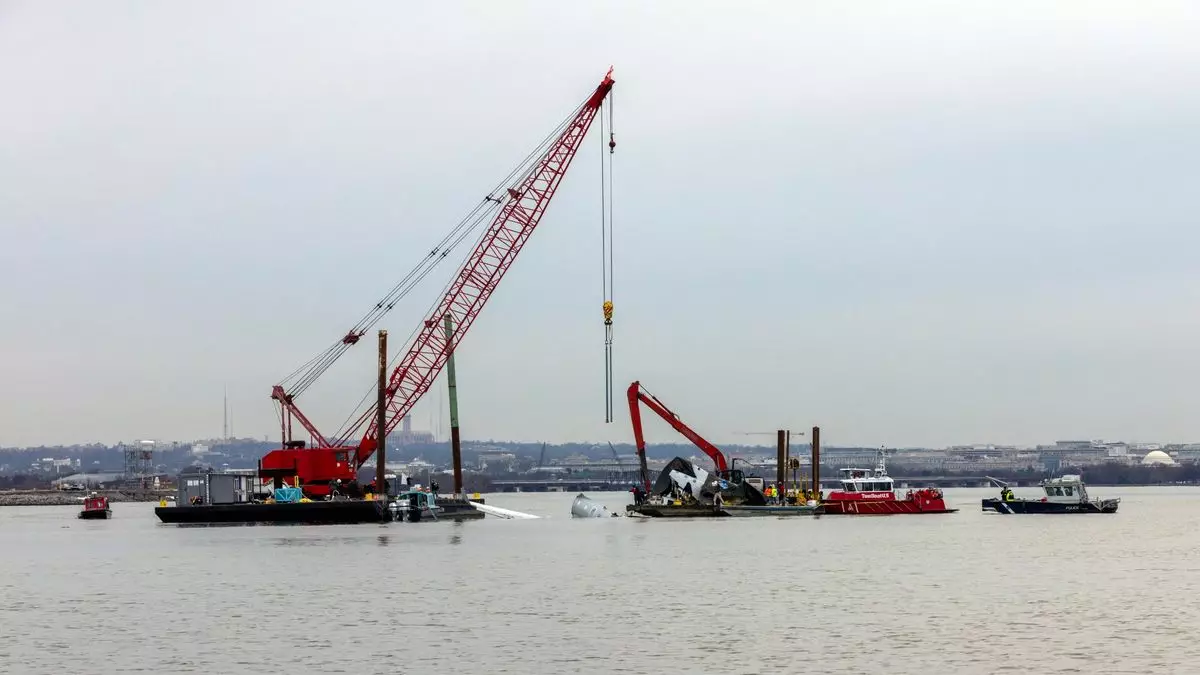The role of the National Transportation Safety Board (NTSB) in investigating air accidents typically garners respect and trust. However, recent events have raised significant concerns about the agency’s independence due to political interference, particularly following President Trump’s comments regarding a tragic collision between an American Airlines jet and an Army helicopter. This incident underscores the potential repercussions that political commentary can have on the integrity of investigative processes.
The Collision: A Tragic Event
On January 29, a Bombardier CRJ-700 regional jet collided with a U.S. Army Black Hawk helicopter during its approach to Reagan National Airport, resulting in the deaths of all 67 individuals on both aircraft. This catastrophic event triggered an immediate investigation by the NTSB, which is tasked with uncovering the factual circumstances leading to such incidents without external pressure or influence. The NTSB has long been seen as a gold standard in accident investigations, known for its impartiality and thoroughness.
However, the sensitivity surrounding such disasters is heightened when prominent figures enter the narrative early on. Following the crash, President Trump publicly speculated about the role of diversity initiatives in causing the accident, despite not having any factual evidence to back up his statement. His assertion drew criticism from political analysts, who warned that such comments could unsettle the investigative team. Mark Jones, a political science professor, suggested that the President’s premature remarks may inadvertently pressure the NTSB into exploring tangential and politically charged topics that could distract them from their primary investigative duties.
The NTSB operates independently and is characterized by a unique governance structure, with appointees serving overlapping terms across presidential administrations. This design is intended to protect the agency from political whims while ensuring continuity in safety oversight. However, the current political climate raises questions about whether this independence is sustainable when political figures, like President Trump, choose to interject their viewpoints into the investigation process.
David Clark, a political science expert, noted that the potential for political backlash looms large. If the NTSB’s findings diverge from the narrative established by the President, the agency may find itself facing political scrutiny. There is a concern that congressional allies could wield influence over the NTSB’s budget and operations, potentially complicating its mission to maintain aviation safety. This scenario exemplifies the balancing act agencies must perform to uphold integrity while navigating political landscapes.
Additionally, NTSB officials have reiterated their commitment to a factual investigation, asserting that they will adhere to prompt and accurate reporting. This is a reassuring sentiment; however, the complexities introduced by political figures can cloud the clarity that is essential for effective investigation. The remarks made by NTSB Chair Jennifer Homendy reflect an awareness of the media’s role in shaping narratives, but they do not directly address the complications introduced by presidential interference.
As the NTSB continues its investigation of the D.C. crash, the integrity of their processes remains under scrutiny. Past leaders of the agency have expressed concerns over the influence of external voices. Peter Goelz, a former managing director at the NTSB, described Trump’s comments as detrimental to the established reputation of the agency, which has enjoyed a long-standing commitment to unbiased investigations. He articulated fears that such political commentary could dismantle years of hard-earned credibility.
Moreover, the potential for future political interference is worrying. Historical precedents illustrate patterns of presidents intervening in agency matters. The long-established norms of the NTSB are at risk if a trend of politicization continues, suggesting a future where investigations may be influenced more by political pressures than the evidence at hand. This could have dire consequences for aviation safety as findings might be skewed to align with political narratives rather than factual accuracy.
The implications of President Trump’s speculative comments on the NTSB’s investigation into the January 29 collision reveal a broader issue of political interference in independent agencies. The ability of the NTSB to maintain its impartiality and uphold the standard of rigorous air safety investigations is crucial. As we move forward, it is imperative that the lines separating political discourse from factual investigation remain clear to preserve the sanctity and efficacy of independent safety oversight. The stakes are undeniably high; the safety of air travel and the trust placed in investigative bodies are paramount in a society reliant on aviation. Balancing these forces will be essential for future administrations, lest political agendas overshadow crucial public safety outcomes.


Leave a Reply